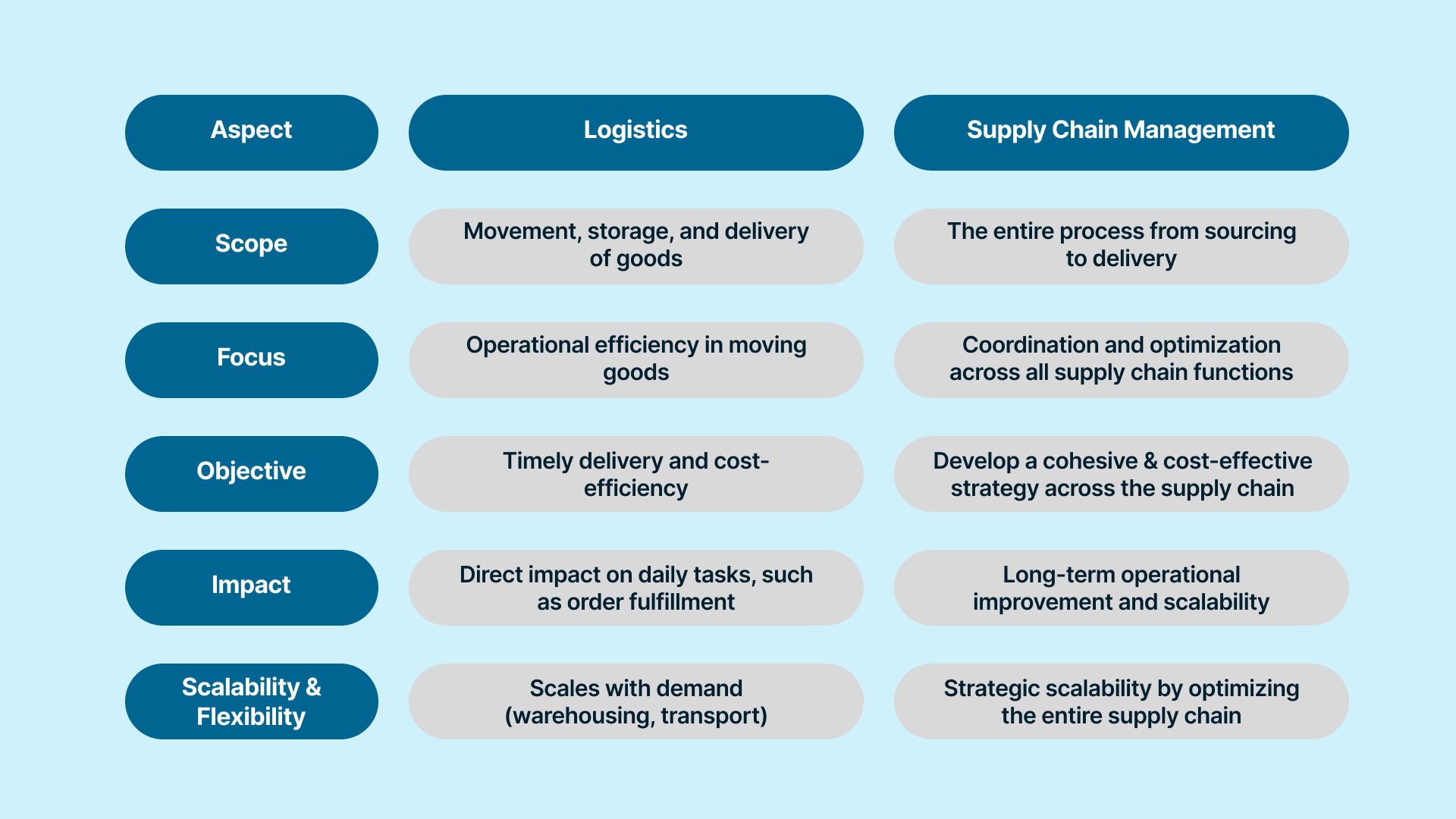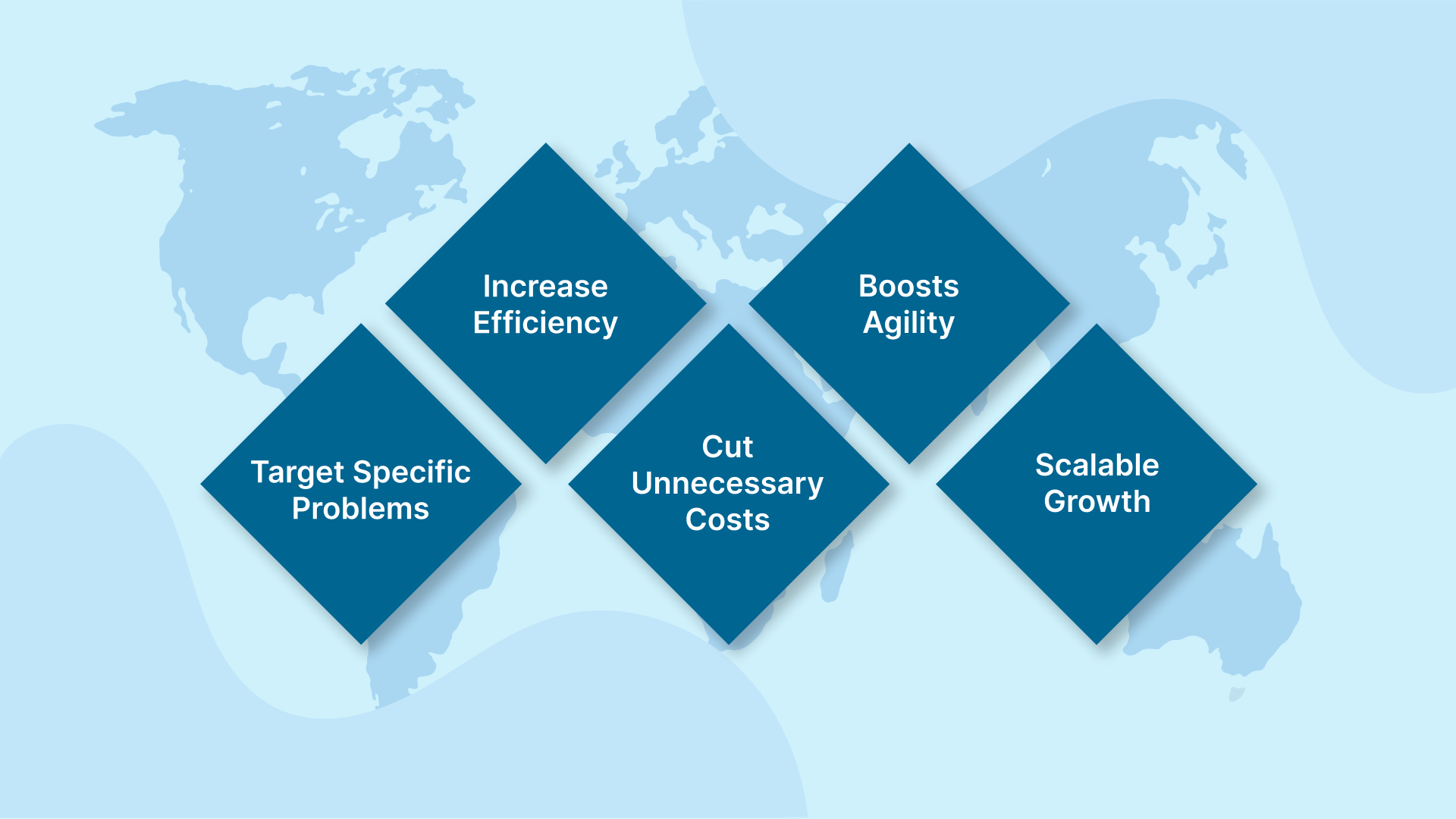Are you struggling with operational inefficiencies that affect your delivery times, customer satisfaction, or bottom line?
The key to overcoming these challenges may lie in understanding the difference between logistics and supply chain management, two critical aspects of your business that, if optimized, can improve both efficiency and cost-effectiveness.
The Philippine logistics and warehousing market is projected to grow at a CAGR of 7.08% from 2025 to 2030, driven by key industries such as healthcare, telecommunications, electronics, and retail. With this growth, supply chain efficiency remains a key economic driver, projected to expand by 6.42% from 2025 to 2030, reaching a market volume of approximately USD 40.57 billion by 2030. The need for businesses to streamline their operations is more urgent than ever to remain competitive in this rapidly growing market.
This blog will explore the role of logistics and supply chain management, highlighting their differences and how understanding them can help you optimize operations, reduce costs, and ensure long-term success.
Logistics is a vital part of business operations that focuses on the movement, storage, and management of goods throughout the supply chain. It involves the planning, execution, and control of the efficient flow of products from the point of origin to the end consumer.
Whether you’re running an online store, managing a warehouse, or overseeing distribution, logistics plays a crucial role in ensuring your products reach customers in the best condition and within the desired time frame.
Key aspects of logistics include:
For e-commerce enterprises, logistics serves as the fundamental pillar of customer satisfaction and loyalty. Timely and efficient delivery, coupled with precise inventory tracking, distinguishes businesses in the contemporary competitive digital marketplace.
Supply Chain Management (SCM) is a broader strategy that encompasses logistics but goes beyond it. It involves managing the entire lifecycle of a product from the initial concept, sourcing raw materials, production, distribution, and final delivery to the customer. SCM is about optimizing the flow of goods, information, and finances between all stakeholders, including suppliers, manufacturers, warehouses, and retailers, to improve overall efficiency and profitability.
Key components of supply chain management include:
Supply chain management offers businesses a strategic framework to optimize costs, enhance efficiency, and deliver a seamless customer experience. For businesses like those working with Inspire Solutions Asia, integrating SCM strategies ensures that each step from order placement to delivery is optimized, minimizing delays and reducing costs.
Read: Supply Chain Examples and Effective Strategies Explained
For e-commerce businesses, especially entrepreneurs, SMEs, and international sellers entering new markets like the Philippines, understanding the distinction between logistics and supply chain management is crucial for optimizing operations and scaling effectively. Here’s a quick breakdown of the key differences:
Logistics focuses on the physical movement, storage, and delivery of goods and materials. This includes managing warehouses, handling inventory, fulfilling orders, and ensuring fast deliveries to customers. For businesses, logistics ensures that products are where they need to be, when they need to be there, reducing delays and improving customer satisfaction.
Supply Chain Management (SCM), however, is broader, covering everything from sourcing materials and production to inventory management and distribution. SCM ensures that all these processes are aligned, helping businesses reduce costs, improve efficiency, and meet customer demand reliably.
Logistics focuses on operational efficiency, ensuring that products are stored correctly, shipped on time, and delivered without error. For e-commerce managers handling high order volumes, effective logistics enables them to meet delivery promises through reliable shipping systems, such as same-day and next-day delivery.
Supply Chain Management, on the other hand, is about coordination and strategy. SCM integrates procurement, production, and logistics to create a streamlined, cost-efficient supply chain that supports long-term growth. For businesses scaling in new markets, SCM ensures that all elements of the supply chain—from suppliers to delivery—work cohesively.
The goal of logistics is to provide timely delivery and cost-efficient movement of goods. For an online retailer or entrepreneur, managing logistics effectively ensures that customers receive their orders promptly, which helps build trust and foster repeat business.
Supply Chain Management aims to optimize the entire process, from sourcing and production to distribution. By improving every link in the supply chain, SCM enables businesses to reduce costs and establish a responsive, scalable operation that can effectively handle growth.
Logistics has a direct impact on day-to-day operations, ensuring that goods are moved efficiently, inventory is well-managed, and orders are fulfilled on time. For a growing SME, effective logistics systems enable your business to scale quickly and meet the rising demands of customers.
On the other hand, SCM has a significant impact on long-term operations. It focuses on creating an optimized system that integrates procurement, production, and logistics, allowing your business to adapt to changes, reduce costs, and improve service delivery.
Logistics offers immediate scalability. As your business grows, logistics allows you to expand warehouse space, increase delivery options, or streamline fulfillment processes to handle more orders efficiently.
Supply Chain Management, however, focuses on strategic scalability. It ensures that as your business expands, your entire supply chain, from sourcing to fulfillment, can scale without compromising efficiency or customer satisfaction.
To quickly compare the key aspects of logistics and supply chain management, the table below summarizes the most important differences:

| Aspect | Logistics | Supply Chain Management |
|---|---|---|
| Scope | Movement, storage, and delivery of goods. | The entire process from sourcing to delivery. |
| Focus | Operational efficiency in moving goods. | Coordination and optimization across all supply chain functions. |
| Objective | Timely delivery and cost-efficiency. | Develop a cohesive and cost-effective strategy across the entire supply chain. |
| Impact | Direct impact on daily tasks, such as order fulfillment. | Long-term operational improvement and scalability. |
| Flexibility & Scalability | Scales with demand (warehousing, transport). | Strategic scalability by optimizing the entire supply chain. |
By understanding the distinction between logistics and supply chain management, you can better align your business strategy to enhance operations, reduce costs, and deliver exceptional service to your customers.
Read: Comprehensive Guide to Logistics Planning Strategies
Logistics plays an integral role in the timely delivery of products, but it is only one part of the supply chain management process. Within supply chain management (SCM), logistics fits into a broader framework that coordinates procurement, manufacturing, and distribution to enhance overall efficiency and effectiveness.
For example, in an e-commerce business, warehousing and fulfillment (logistics) are key to guaranteeing that the right product is ready for shipping. Additionally, effective supply chain management involves sourcing inventory from suitable suppliers, optimizing the production process for greater efficiency, and coordinating the distribution network to enhance delivery times.

Recognizing the difference between logistics and supply chain management is mandatory for streamlining your operations, reducing costs, and scaling effectively. When you know where to focus your efforts, you can make smarter, more impactful decisions that lead to long-term success.
In a market like the Philippines, where the e-commerce industry is booming, having a clear distinction between logistics and supply chain management can guide you in choosing the right tools, partners, and strategies to scale your business effectively.
At Inspire Solutions Asia, we specialize in providing integrated solutions that help businesses like yours simplify their operations, reduce costs, and scale efficiently in the competitive e-commerce market.
Here’s how we can assist you:
If you are ready to optimize your logistics and supply chain management for better operational performance and cost efficiency, Inspire Solutions Asia is here to help. Our integrated services provide everything you need to scale your business successfully, from warehousing and fulfillment to sourcing, financing, and reliable delivery services.
Logistics and supply chain management are essential components of your business strategy, but they play distinct roles. At its core, logistics is all about the efficient movement, storage, and delivery of goods. In contrast, supply chain management encompasses the broader spectrum, managing the entire journey from procurement to ensuring customer satisfaction. By understanding these differences, you can tackle operational challenges more effectively, reduce costs, and enhance the customer experience, all of which contribute to sustainable growth.
At Inspire Solutions Asia, we provide comprehensive solutions that enable businesses like yours to enhance both logistics and supply chain management. Our services, such as same-day and next-day delivery, sourcing and importation, and flexible financing, are designed to simplify operations, reduce inefficiencies, and support scalable growth. We work with you to ensure that both logistics and the broader supply chain are optimized, enabling you to reach your business goals more quickly.
Contact us today to schedule a consultation and discover how our solutions can drive your business forward. Get in touch here.